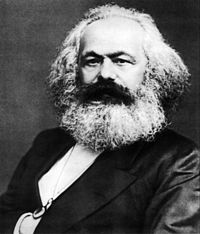What is Marxism?
 •
by
•
by Vasili Zaytsev

Marxism is an economic and sociopolitical worldview and method of socioeconomic inquiry based upon a materialist interpretation of historical development, a dialectical view of social change, and an analysis of class-relations within society and their application in the analysis and critique of the development of capitalism. In the mid-to-late 19th century, the intellectual development of Marxism was pioneered by two German philosophers: Karl Marx and Friedrich Engels. Marxist analyses and methodologies have influenced multiple political ideologies and social movements throughout history. Marxism encompasses an economic theory, a sociological theory, a philosophical method, and a revolutionary view of social change. There is no one definitive Marxist theory; Marxist analysis has been applied to a variety of different subjects and has been modified during the course of its development, resulting in multiple and sometimes contradictory theories that fall under the rubric of Marxism or Marxian analysis.

Marxism is based on a materialist understanding of societal development, taking as its starting point the necessary economic activities required by human society to provide for its material needs. The form of economic organization, or mode of production, is understood to be the basis from which the majority of other social phenomena — including social relations, political and legal systems, morality and ideology — arise (or at the least by which they are greatly influenced). These social relations form the superstructure, for which the economic system forms the base. As the forces of production (most notably technology) improve, existing forms of social organization become inefficient and stifle further progress. These inefficiencies manifest themselves as social contradictions in the form of class struggle.

According to Marxist analysis, class conflict within capitalism arises due to intensifying contradictions between highly-productive mechanized and socialized production performed by the proletariat, and private ownership and private appropriation of the surplus product in the form of surplus value (profit) by a small minority of private owners called the bourgeoisie. As the contradiction becomes apparent to the proletariat, social unrest between the two antagonistic classes intensifies, culminating in a social revolution. The eventual long-term outcome of this revolution would be the establishment of socialism - a socioeconomic system based on cooperative ownership of the means of production, distribution based on one's contribution, and production organized directly for use. Karl Marx hypothesized that, as the productive forces and technology continued to advance, socialism would eventually give way to a communist stage of social development. Communism would be a classless, stateless, moneyless society based on common ownership and the principle of "From each according to his ability, to each according to his needs".
to be continued...


Comments
if there's no pirinç, eat pasta instead
pirinç
Başarıyla 0.31 CYP hibe ettin. Oyuncu kabul ederse hibeniz oyuncunun hesabına aktarılıcaktır.
what is marxism ?
baby dont heart me
dont heart me
nomore
Με πρόλαβες γενίτσαρε. Αν και είναι hurt me
eimai romantikos
yeah, a very nice idea, this marxism, but that's about it 😞
voted
voted
voted
Marx F.C. vs Mpakounin United
1-0 Halftime
1-2 Final
Marxism implied with anarchism is going to rock n roll!